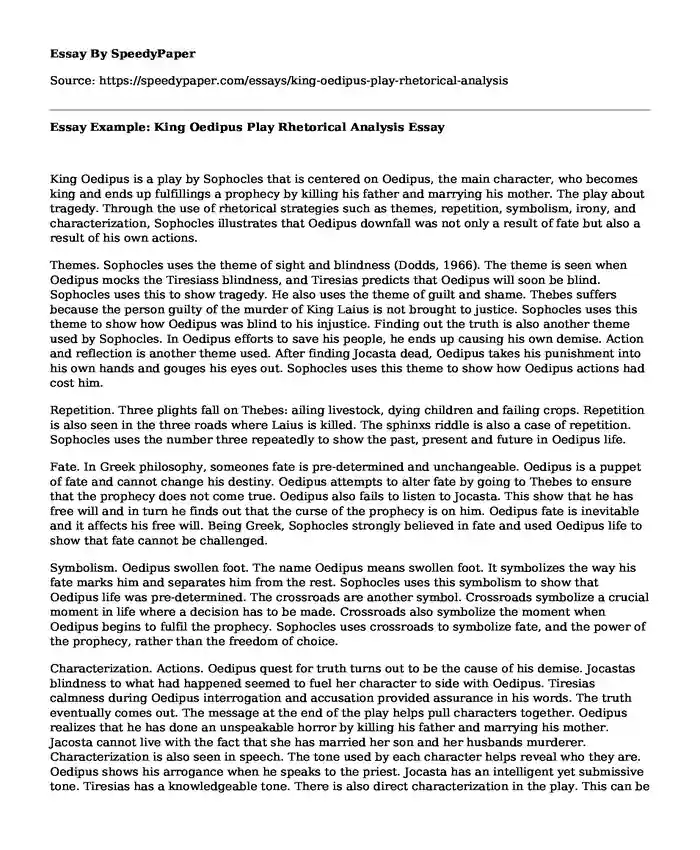
| Type of paper: | Essay |
| Categories: | Literature Theatre Sophocles |
| Pages: | 3 |
| Wordcount: | 732 words |
King Oedipus is a play by Sophocles that is centered on Oedipus, the main character, who becomes king and ends up fulfillings a prophecy by killing his father and marrying his mother. The play about tragedy. Through the use of rhetorical strategies such as themes, repetition, symbolism, irony, and characterization, Sophocles illustrates that Oedipus downfall was not only a result of fate but also a result of his own actions.
Themes. Sophocles uses the theme of sight and blindness (Dodds, 1966). The theme is seen when Oedipus mocks the Tiresiass blindness, and Tiresias predicts that Oedipus will soon be blind. Sophocles uses this to show tragedy. He also uses the theme of guilt and shame. Thebes suffers because the person guilty of the murder of King Laius is not brought to justice. Sophocles uses this theme to show how Oedipus was blind to his injustice. Finding out the truth is also another theme used by Sophocles. In Oedipus efforts to save his people, he ends up causing his own demise. Action and reflection is another theme used. After finding Jocasta dead, Oedipus takes his punishment into his own hands and gouges his eyes out. Sophocles uses this theme to show how Oedipus actions had cost him.
Repetition. Three plights fall on Thebes: ailing livestock, dying children and failing crops. Repetition is also seen in the three roads where Laius is killed. The sphinxs riddle is also a case of repetition. Sophocles uses the number three repeatedly to show the past, present and future in Oedipus life.
Fate. In Greek philosophy, someones fate is pre-determined and unchangeable. Oedipus is a puppet of fate and cannot change his destiny. Oedipus attempts to alter fate by going to Thebes to ensure that the prophecy does not come true. Oedipus also fails to listen to Jocasta. This show that he has free will and in turn he finds out that the curse of the prophecy is on him. Oedipus fate is inevitable and it affects his free will. Being Greek, Sophocles strongly believed in fate and used Oedipus life to show that fate cannot be challenged.
Symbolism. Oedipus swollen foot. The name Oedipus means swollen foot. It symbolizes the way his fate marks him and separates him from the rest. Sophocles uses this symbolism to show that Oedipus life was pre-determined. The crossroads are another symbol. Crossroads symbolize a crucial moment in life where a decision has to be made. Crossroads also symbolize the moment when Oedipus begins to fulfil the prophecy. Sophocles uses crossroads to symbolize fate, and the power of the prophecy, rather than the freedom of choice.
Characterization. Actions. Oedipus quest for truth turns out to be the cause of his demise. Jocastas blindness to what had happened seemed to fuel her character to side with Oedipus. Tiresias calmness during Oedipus interrogation and accusation provided assurance in his words. The truth eventually comes out. The message at the end of the play helps pull characters together. Oedipus realizes that he has done an unspeakable horror by killing his father and marrying his mother. Jacosta cannot live with the fact that she has married her son and her husbands murderer. Characterization is also seen in speech. The tone used by each character helps reveal who they are. Oedipus shows his arrogance when he speaks to the priest. Jocasta has an intelligent yet submissive tone. Tiresias has a knowledgeable tone. There is also direct characterization in the play. This can be seen in the chorus which shows the characters strength and weaknesses. The chorus also highlights the characteristics of Oedipus and Creon. Sophocles uses characterization mainly to show how Oedipus actions led to his downfall.
Style. Sophocles uses irony in the play. Irony of sight: Oedipus calls Tiresias a sightless, witless old man (Helmbold, 1951). Verbal irony: Oedipus prayed that king Laius life be consumed in evil and wretchedness. Tragic irony: Oedipus is referred to as the noblest of men and told to restore life to his city. Sophocles uses irony to show how Oedipus whole life was simply a case of classic tragedy.
The rhetorical strategies used by Sophocles have succeeded to prove his point that Oedipus actions also contributed to his downfall as seen in the analysis above.
Works Cited
Dodds, Eric Robertson. "null (Second Series)." On Misunderstanding the Oedipus Rex1 (1966): 37-49.
Helmbold, William Clark. "The Paradox of the Oedipus." AJP 72 (1951): 293-300.
Cite this page
Essay Example: King Oedipus Play Rhetorical Analysis. (2020, Apr 28). Retrieved from https://speedypaper.net/essays/king-oedipus-play-rhetorical-analysis
Request Removal
If you are the original author of this essay and no longer wish to have it published on the SpeedyPaper website, please click below to request its removal:
- Free Essay about Community Life
- My Autobiography Essay Sample
- Guidelines for Field Triage of Injured Patients - Free Essay in Medicine
- The Ursuline Nuns in America, Free Essay Example
- Free Essay: The Integumentary System on the Integumentary System
- Essay Sample on Internal Analysis of Coca-Cola
- Essay Example: Disorders of Memory and Language
Popular categories




